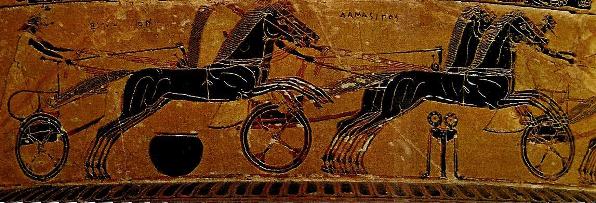
January 31, 2013, by Alan Sommerstein
Multiple champion “killed” in racing tragedy
As this is National Storytelling Week, I thought I’d put up my favourite piece of storytelling from ancient drama – an early classic of sports reporting, from Sophocles’ Electra. The old slave-tutor of Prince Orestes of Argos has come to bring some very sad news to his master’s mother.
“He went to the famous competitive showcase of Greece for the Pythian Games, and when he heard the proclamation for the first event, the foot-race, he entered and did brilliantly, to the admiration of all present: the initial impression he made was matched by the outcome of the contest, and he left the arena with the prize of a glorious victory. And to cut a long story short, I know of no one who ever achieved such successes. I need only say that every time the judges announced a contest, the honour and prestige of victory went to him, and over and over again he was proclaimed as ‘an Argive, Orestes by name, the son of Agamemnon who once mustered that famous army from all of Greece’. That was how it was; but when some god stands in one’s path, not even the strongest can escape. When the sunrise of a new day brought the contest of swift horse-chariots, he entered it together with many other drivers. One was an Achaean, one from Sparta, two masters of yoked chariots came from North Africa; the fifth of the field had a team of Thessalian mares, the sixth had bay fillies from Aetolia, the seventh came from Magnesia, the eighth, with a team of greys, from Aeniania; the ninth was from the divinely-built city of Athens, and the tenth and last chariot was occupied by a Boeotian. The appointed judges made them stand at the start, drew the lots and placed the chariots in position, and then, at the blast of the bronze trumpet, they were off. They all shouted to their horses and shook their reins, the whole course was filled with the noise of the rattling chariots, and a cloud of dust arose. They were all bunched together, making free use of the goad, as each tried to get past the wheel-hubs and neighing horses of the others; each could feel the foaming breath of the horses behind him at his back and close to his whirling wheels. Orestes was always grazing the turning-post with his wheel-hub, letting the off-side horse run free while checking the one on the near side. For several laps all the chariots raced safely; but then the Aenianian lost control of his horses, they bolted, and at the turn from lap six to lap seven they ran right into a Libyan chariot. This one mishap caused driver after driver to crash and fall, and the whole plain of Crisa was filled with wrecked chariots. The canny driver from Athens saw what was happening, wheeled outwards, eased off, and bypassed the seething storm in the middle of the course. Orestes was driving behind, in last place, putting his trust in a good finish; when he saw that there was only one other driver left, he sent a shrill call through the ears of his swift fillies and gave chase, and soon they were driving neck and neck, now one chariot in front of his rival by a head, now the other. Lap after lap the poor boy and his chariot ran safe and upright; but then, as he pulled on the nearside rein and the horse turned, without noticing it he hit the pillar, broke the hub off the axle, fell from his chariot, and got tangled in the reins; and as he fell to the ground, his horses were careering all over the track. When the crowd saw he had fallen out, they cried out in grief for the young man who had achieved so much and was suffering so terribly, now dashed to the ground, now with his legs pointing skywards – until the other drivers just managed to stop the bolting horses and free him. His wretched body was covered in blood, and none of his loved ones would have recognized him if they had seen him. He was cremated on a pyre, and then straight away the sad ashes of that great body were put in a little bronze urn which is bring brought here by two Phocians chosen for the purpose, so that he can be buried in his father’s land.”
The tutor was too taken up with Orestes’ fate to mention it, but the Athenian audience will not have failed to notice who actually won the race!
Only, none of it ever happened. Only one statement in this whole story is true. There are indeed two men bringing an urn to Argos. But only one of them (Pylades) is a Phocian; the other is Orestes himself, and he is coming to take revenge for the murder of his father by killing the perpetrators – one of whom is the mother who is listening to this story.
No comments yet, fill out a comment to be the first

Leave a Reply